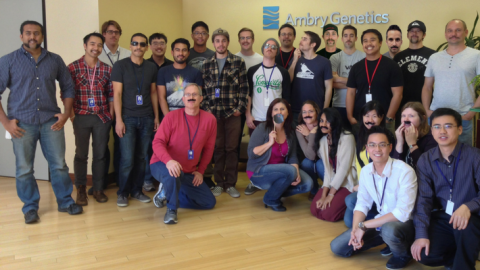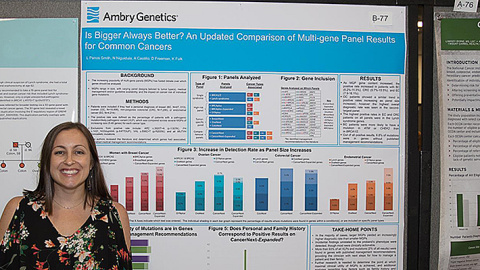- By Jessica Profato, MS, CGC
- Posted January 4, 2019
3 Common Questions from Healthcare Providers about Genetic Testing
An estimated 266,000 women and 2,500 men will be diagnosed with breast cancer this year alone, and up to 10% of these may be hereditary. That’s over 26,000 patients and families whose lives could be significantly impacted by genetic testing, which can help guide personalized risk counseling and medical management. Multigene panels, like BreastNext,…
- By AJ Stuenkel
- Posted June 12, 2018
Real Men Go to the Doctor
Throughout the month of June many 5ks will be run, fundraisers and educational fairs will take place, and blue will be worn, all in the name of Men’s Health. In the U.S., June is designated as Men’s Health Month while June 11-18 is recognized internationally as Men’s Health Week, with goal of both to “heighten the awareness of preventable…
- By Jessica Profato, MS, CGC
- Posted June 8, 2018
I Survived Cancer, so Why do I Need Genetic Testing for it?
As a clinical genetic counselor, I saw many cancer survivors for genetic counseling. In some cases, it had been 30-40 years since they were diagnosed. Some of them were in their 60s-70s when I saw them, but they were young at the time of their cancer diagnosis. Years later, they were referred to me to talk about the possibility that their history…
- By Brooke Overstreet, MS, CGC
- Posted May 15, 2018
Increase the Detection of Patients with Hereditary Cancer
Identifying patients with hereditary cancer is critical, so that you can gather additional information for personalized risk counseling and management planning. The first step is to use personal and family history information to find out which patients may be candidates for genetic testing. With tools like our hereditary cancer questionnaire,…
- By Jessica Profato, MS, CGC
- Posted December 6, 2017
How Ambry Affected Hereditary Cancer Testing in 2017
It has been an exciting and busy year at Ambry Genetics, packed with steps forward on our path towards understanding all human disease. We have continued our dedication, not only to quality testing, but to innovation, research, and patient advocacy. As we reach the end of 2017, we look forward to an even more impactful 2018 and working together…
- By Michael Squier
- Posted November 6, 2017
My Grandfather Lost His Pancreatic Cancer Battle, but Taught Me a lot About Life
*Editor's Note: This Pancreatic Cancer Awareness Month, Ambry's Creative Director, Michael Squier, is sharing memories and lessons learned from his grandfather, who lost his battle to pancreatic cancer. Ambry encourages everyone to know their family history of cancer. If someone in your family has pancreatic cancer, you could be at an increased…
- By Laura Panos Smith
- Posted October 4, 2017
Hereditary Cancer Tests: Is Bigger Always Better?
Just five short years ago, hereditary cancer testing was much simpler for patients and healthcare providers. There were finite criteria, associated with a handful of genetic conditions, and healthcare providers could order single-gene (or single-syndrome) genetic testing for patients who met those criteria. Since 2012, the field of genetics has…
- By Cynthia Rigali Lund
- Posted June 8, 2017
Things I Know for Sure this Cancer Survivors Month
*Editor’s Note: June is National Cancer Survivors Month, and Ambry Genetics will be celebrating cancer survivors as well as their families and communities by sharing their inspiring stories. Although part of me wants to forget, I hear the whispers every day. As a cancer survivor of 4 ½ years, June is a special month that commemorates…
- By Deepti Babu, MS, CGC
- Posted May 17, 2017
Lynch Syndrome - It's more common than you think
Did you know that more than 1 in 4 of those with Lynch syndrome (LS) are missed by current genetic testing guidelines? New research from Ambry Genetics and Ohio State University of nearly 35,000 patients will change how the genetics community thinks about genetic testing strategies, lifetime cancer risks, and medical management for people with…
- By Deepti Babu, MS, CGC
- Posted April 10, 2017
Can Patients with Hematological Cancer Have Genetic Testing?
The short answer is: Genetic testing is possible, but depends on other factors. The question of whether genetic testing is possible for patients with a history of hematological cancer comes up often in the clinical setting and in the testing laboratory. This makes sense since genetic testing is performed on DNA isolated from white blood cells…









